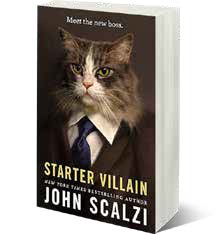When legendary writer Stephen King calls a book ìinsanely readable,î I am inclined to believe him. But other readers have not been as kind in their assessment of ìThe Plot,î a novel by Jean Hanff Korelitz. Judging by the online reviews, this is a book that readers either love or hate, with few occupying the middle ground. That is precisely why I chose it for this monthís review.Jacob Finch Bonner is a literary one-hit wonder, a promising novelist with a successful debut novel unmatched by his follow-up work. He likens it to landing in a ìspecial purgatory for formerly promising writers, from which so few of them ever emerged.î Now Jake teaches writing in a third-rate Master of Fine Arts program, avoids working on his next book and struggles to maintain some semblance of self-respect.Then student Evan Parker walks into his class, confidently declaring that his story will be an instant hit. Jake pegs the young man as an overconfident jerk of middling talent, but much to his dismay, Evan is not wrong. Regardless of writing skills, his stunning plot is sure to garner the fame and fortune that slipped through Jakeís grasp.A few years later, Jake learns that his arrogant former student died shortly after the MFA class. He can find no evidence that Evan published the book, or ever completed it at all. Jake is ìout of pride, hope, time and ñ- he could finally admit ñ- ideas of his ownî and sees an opportunity in Evanís presumably unused plot. Stealing another writerís idea is an honor violation more than a crime. After all, ideas are everywhere and typically not subject to copyright. Plenty of writers have borrowed material from their peers. Wouldnít it be a shame to let this brilliant idea die with its creator?Fast forward three years. Jacob Finch Bonnerís acclaimed novel ìCribî has sold more than two million copies and is firmly entrenched on the bestseller lists. Everyone raves about the bookís infamous plot twist as Jake moves through the world of book tours, appearances and a movie adaptation ñ- all the heady stuff writers dream about. Falling in love with a beautiful radio producer in Seattle should have been the proverbial icing on the cake of Jakeís new life.But Jake lives in constant fear that someone will discover how he came up with such a remarkable story. He deflects questions about the source of his inspiration with comments like, ìThere are stories growing from treesî and ìThe possibilities are endless.î All the while, he knows the truth could end his career for good, relegating him ìto the circle of shamed writers forever and without hope of appeal.îThen a simple but ominous email arrives: ìYou are a thief.î Who is this mysterious accuser? And why are they contacting him now? Even though he had long been expecting this day, Jake has no idea who his antagonist is.More messages and social media posts follow. His publisher confronts Jake about the accusations, and he continues to claim he did nothing wrong. While the publishing company is in damage control mode, Jake takes it upon himself to find out who is behind the smear campaign. What he uncovers is as unsettling as his own novelís vaunted plot twist. The story wraps up almost too neatly through a villainous monologue that leaves few, if any, questions about what just happened and why.For readers simply looking for an escapist read, ìThe Plotî is a compelling story that can be hard to set aside. Korelitz is a skilled storyteller who writes with an amusingly wry tone. As indicated by online comments, though, the plot may be predictable to some readers but a pleasant surprise to others. Jakeís constant self-flagellation can grow tiresome, but at the same time, it effectively illustrates the profound professional misery that allows him to rationalize poor choices.Korelitz also illuminates some hard truths about writers, aspiring writers and the publishing industry while skewering the popular mantra that ìanyone can be a writer.î Her story provokes an examination of moral, ethical and legal issues surrounding intellectual property. While the book necessarily dwells in the realm of writing and publishing, readers should not need literary ambitions to enjoy it.The final verdict? I donít think Stephen King was wrong on this one, but readers will have to decide for themselves.






